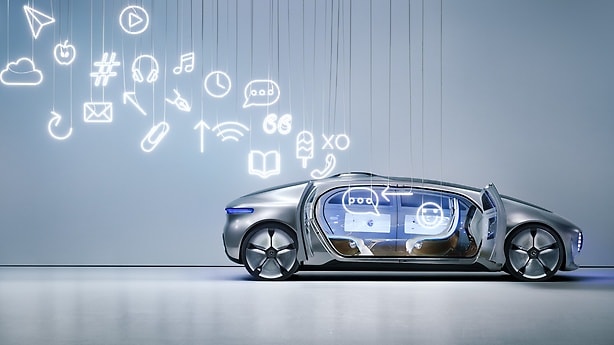Autonomous driving will fundamentally revolutionize the automobile. Artificial intelligence will play a key role in this: Deep Learning as a mega trend.
At the beginning of 2017, Mercedes-Benz and the graphics chip manufacturer NVIDIA provided an insight into the importance of artificial intelligence for the mobility of the future at the CES electronics trade fair in Las Vegas.
When computers learn to learn
Artificial Intelligence (AI) refers to the mimicking of human cognitive abilities by computers. "People have no problem recognizing objects and putting these observations together to form a conceptual model of the world," explains Jen-Hsun Huang, co-founder and CEO of NVIDIA. However, even high-performance supercomputers were unable to do this until just recently.
It was only so-called Deep Learning which brought about the breakthrough, according to Huang, who called artificial intelligence the "solution to the challenge of autonomous driving" in his keynote speech at the opening of the trade fair.
In Deep Learning, the central learning method for artificial intelligence, computers get to know the world as a hierarchy of concepts. During the course of a learning process, they are confronted with ever more complex concepts, which they process on the basis of their experience with the previous, simpler concepts. In this way, they constantly acquire new skills in order to understand and master their environment.
From a vehicle to an intelligent co-pilot
Through deep learning, vehicles will “learn” to understand its environment. Connected to the cloud, a Mercedes will develop into an adaptable co-pilot that permanently keeps an eye on safety and comfort of its passengers, both inside and outside the vehicle.
In the future, artificial intelligence will make it possible for software to learn from the driver's routine so that it can make personal predictions and submit recommendations. Examples of these are route guidance in the morning or the route to the nearest gas station, taking into account factors such as driving behavior, current sensor input and the destination of the trip.
Artificial intelligence will make a significant contribution towards rendering the development of autonomous driving ready for series production. Mercedes-Benz and NVIDIA have therefore built up a long-term partnership in order to make artificial intelligence suitable for everyday use. "You need outstanding software and tremendous computing power to do things which the driver considers to be the most normal things in the world, but which require immense technical performance behind the scenes," says Sajjad Khan, Vice President Digital Vehicle & Mobility, Daimler AG.
In order to achieve true artificial intelligence, the development process needs to be turned completely upside down. The starting point is the computer architecture, on which everything else is based. Mercedes-Benz and NVIDIA have been pursuing this vision for three years. At the end of the process, a vehicle is to be constructed that works entirely on the basis of artificial intelligence – an aim into which almost all well-known technology and car firms have invested massive resources.
